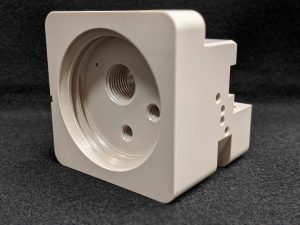The path to success varies from company to company. Regardless of the road chosen, efficiency, innovation, and strategic partnerships play crucial roles for any business model that seeks to thrive amidst the swath of hurdles peppering the board of modern industry. That said, it can be difficult or impossible for a company to achieve efficiency and innovation in every aspect of its operational scope. These limitations often arise from lack of financial ability, mastery of manufacturing processes, industry expertise, or any combination therein. That’s why it’s imperative for businesses to take advantage of that third crucial role, strategic partnerships. One such partnership is contract manufacturing.
Contract manufacturers forge powerful solutions to company limitations and stand as a cornerstone of industry progress. It isn’t only about producing goods; it’s about crafting success stories. In these manufacturing plants, where precision meets potential, businesses find the means to overcome limitations, and therefore, the means to grow.
What is Contract Manufacturing?
Contract manufacturing is a business model in which a company outsources some production processes to a third-party manufacturer. The hiring company sells these products under their own name or uses them in subsequent steps for processing and assembly. In doing so, the hiring company takes advantage of expertise and resources cultivated by seasoned manufacturers. There are a lot of reasons a business may need to outsource production, but a few common hurdles contract manufacturing can overcome are low cost-effectiveness of in-house production, a need for extremely specialized parts, and if the company centers operations around non-production processes like innovation, marketing, and design.
Overhead Costs
Well established manufacturers help companies avoid overhead costs required for internal production. Capital costs like facility, equipment, and raw material are often barriers to entry for smaller companies and inconvenient for larger ones that would rather focus on core competencies. Training, maintenance, and labor can further stretch company coffers in difficult or unsustainable ways. Depending on need, the right manufacturing contract(s) can save a company hundreds of thousands of dollars on internal production costs.
Technical Expertise
Experienced manufacturers are highly proficient at what they do and can provide valuable information on a range of topics like material choice and application, and production processes. Some companies, like Piedmont CMG, can offer insight and work with original equipment manufacturers (OEMs) in product design and prototyping before moving to full scale production runs. Established in their industry, contract manufacturers have existing relationships with raw material suppliers, and they have honed their operations to achieve max efficiency. That production history includes all the trial and error associated with quality control, and good manufacturers take responsibility for inspections as well as replacing defective products that come from their production sites. This saves the hiring company in labor, material waste, and costs from the trial and error of developing its own operational efficiency and quality control methods.
Economies of Scale
A hiring company receives further reduction to costs by taking advantage the manufacturer’s partnerships. Contract manufacturers benefit from scaling economic advantages as their output and customer portfolio grows. One way this occurs is with raw material purchases. The variable cost of bulk material receives scaling discounts as a manufacturer’s purchases grow in volume. Set up costs associated with starting a new operation are easier and less costly as well. Furthermore, fixed costs of the manufacturing operation are spread over larger product quantities, reducing cost per unit. Calling on a contract manufacturer allows the hiring company to benefit from their partner’s economies of scale.
The Bottom Line
The benefits of contract manufacturing can ease the burden of company operations, even making or breaking a business in some cases. Outsourcing production eases employee workload, optimizes human capital potential and capital costs, and allows hiring companies to focus on the things they excel at without additional burden. Still, the wrong choice of manufacturing partners has as much potential for hurting business for a company as having no partners at all. That’s why it’s extremely important to choose the right manufacturer(s) for your company workload. Some of the most important factors to look for in a contract manufacturer are price, quality, and production capabilities.
The best contract manufacturers:
- Have a wealth of expertise
- Produce in large volumes
- Have their own manufacturing facilities
- Produce high-quality products
- Have refined manufacturing processes
- Have exacting quality control processes
- Have advanced supply chain and delivery systems
- Have the flexibility to adjust or change products as needed
- Have a well-documented history and references
- Rarely miss deadlines
The CMG Difference
Piedmont CMG is a tier II manufacturer of fluidic components and assemblies. We have honed our production and quality control processes to a razor’s edge with decades worth of experience. Our engineering and production teams can assist from product design and NPI to full production runs, and our ISO 9001:2015 certification is a testament to our internationally recognized quality management systems. Follow these links to learn more about us, our rapid prototyping services, and traceability in quality assurance. Contact us today and discover the CMG difference for yourself.


